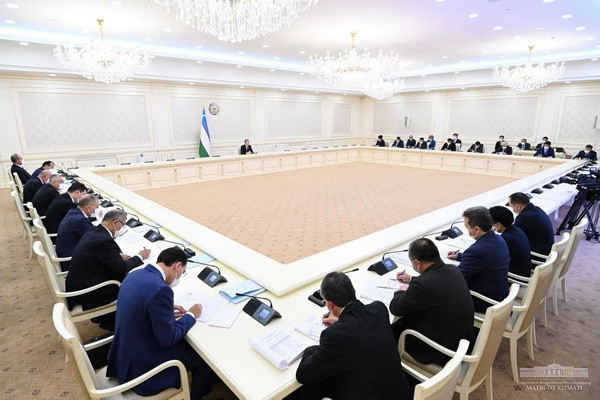
The important directions of transformations in the healthcare sector identified
Tashkent, Uzbekistan (UzDaily.com) -- On 18 May, chaired by President Shavkat Mirziyoyev, a video conference was held on measures to increase the effectiveness of reforms in the health sector.
Peace and health are the main values in human life. Their implementation is determined by an important direction of the social policy of our state.
In particular, the medical sphere is being gradually improved on the basis of the Concept for the Development of the Healthcare System of the Republic of Uzbekistan. Over the past year, more than 20 decrees and decrees have been adopted aimed at improving the quality of medical care. This year, 21 trillion soums have been allocated from the budget, which is 3 times more than in 2017.
However, much remains to be done to improve the efficiency of the system. In local surveys, only 13 percent of respondents said they were experiencing positive changes in the medical field.
The head of state outlined five areas for further transformations.
The first is to turn the primary link of medicine into a system for the early detection and treatment of diseases.
The second is to increase the volume and radically improve the quality of narrow-profile medical services through specialized centers.
Third, through digitalization, to drastically reduce paperwork, bureaucracy and corruption in the field.
Fourth is to develop competition and expand private sector participation in all areas of medicine.
Fifth is to raise the level of knowledge of health workers, to develop medical education and science.
The meeting discussed the practical aspects of the implementation of these tasks.
- Imagine how many people will be satisfied and will restore their health if we implement reforms in medicine in a high-quality, targeted manner. When the responsible persons of the sphere, the khokims, will consult with each rural doctor, nurse, study the world experience and take measures, changes will surely occur, Shavkat Mirziyoyev said.
Priority attention should be paid to improving the quality of services in family health centers and polyclinics.
Today, primary care facilities have the capacity to provide treatment for 87 types of diseases. To do this, it is necessary to provide this with qualified personnel, as well as 50 types of medicines and 16 types of medical devices for emergency care.
The President stressed the importance of treating chronic diseases in primary care, especially strengthening the prevention of cardiovascular and gastrointestinal diseases. It is planned to introduce a package of free medical services for the treatment of diseases in primary care.
It was pointed out that it is necessary to improve the qualifications of family doctors in cooperation with the World Health Organization, to attract specialists to remote areas within the framework of the Rural Doctor program. The task was set to improve the standards of the staffs of family medical centers and polyclinics, qualification requirements for doctors and mid-level health workers, and equipment standards.
There are 17 specialized medical centers in the country. They conduct medical examinations in the field, as a result of which diseases are detected at an early stage and access to medical care is facilitated.
In particular, the centers of phthisiology and pediatrics have opened their departments in all regions, due to which, over the past two years, the number of patients arriving in Tashkent has decreased by almost 20 percent.
The head of state emphasized the need to effectively link regional, district and city hospitals to specialized centers and bring qualified medical services closer to the population.
Thus, diagnostics, treatment and rehabilitation for cardiovascular, gastrointestinal, respiratory and dermatological diseases that do not require surgical intervention can be carried out in the regions. At the regional level, there are sufficient conditions for the organization of surgical interventions in the field of eye microsurgery, urology, traumatology, thoracic and abdominal surgery.
And in republican centers, priority should be given to diseases that are difficult to diagnose and high-tech operations.
In this regard, it was instructed to approve the list of diseases to be treated in regional and district hospitals, as well as to take measures to improve the qualifications of doctors.
The khokims were tasked with providing regional medical institutions with high-tech equipment and medical devices, such as angiographs, laparoscopes, and heart-lung machines.
It was also noted that the licensing process for private medical organizations should be simplified and fully digitalized.
Today, modern technologies are being introduced into the activities of medical institutions, of which there are more than 3 thousand in the country. 423 primary care institutions are connected to the information system "Electronic polyclinic".
However, favorable conditions have not been created everywhere for working in a new way. Some healthcare facilities lack computers. Although 28 billion soums have been allocated from the budget for digitalization of the sphere, work in this direction is progressing slowly.
In this regard, it is planned to introduce the position of deputy head for digitalization and development of public-private partnership in the regional health departments. In addition, 2 thousand staffs of nurse-operators will be introduced in all medical institutions.